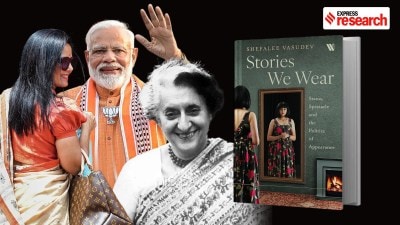Click here to join Express Pune WhatsApp channel and get a curated list of our stories
From a Pune slum to MacArthur genius grant, the formidable arc of a Dalit scholar
The $8,00,000 fellowship is a five-year grant awarded to people who show “exceptional creativity in their work and the prospect for still more in the future”
 Shailaja Paik is a history professor at the University of Cincinnati
Shailaja Paik is a history professor at the University of CincinnatiA one-room house in Siddharth Nagar in Pune’s Yerwada, with its blue corrugated roof propped up by wooden poles, may just be the symbol of Dalit resilience. This is where historian Shailaja Paik, 50, spent her childhood with her parents and three sisters, navigating a journey of poverty and caste and gender discrimination, before ending up as one of the most promising names in Dalit studies and the winner of this year’s MacArthur ‘Genius’ Fellowship.
The $8,00,000 fellowship is a five-year grant awarded to people who show “exceptional creativity in their work and the prospect for still more in the future”. Candidates do not apply for the fellowship but are nominated.
“I started my journey in the slums of Yerwada. It has taken all my life to get here, where I am the only Dalit woman to be a full and distinguished research professor in South Asian Studies in the Western academia. Why is it that many Dalits, and especially Dalit women, have been excluded from international academia?,” says Paik over the phone from the US, where she is a history professor at the University of Cincinnati.
Talking of the evening when Paik received a call informing her of the fellowship, she says, “As a woman of colour in the US and as a Dalit woman, I was overjoyed to receive the fellowship. It is the highest honour and recognition of my work over many years and my fight against racial, caste and gender oppression.”
Paik says that while she had not faced “overt discrimination” in Pune, the awareness and the reality of caste rarely left her. “I have not faced overt discrimination in the city, but there were instances of people saying that I will get a job easily because I am a Dalit and could avail of reservation. Or people found it very hard to believe that I received a Ford Foundation Fellowship to work on my research in the UK.”
She had her earliest — and most direct — encounters with caste during her visits to her ancestral village in Brahmangaon Takli, in Kopargaon taluka. “We did not have our own well and fetched water from a well that belonged to the dominant caste. I used to accompany my cousins and aunts. We would get to the pump first but then, we would see the upper-caste women approaching with the look in their eyes that said, ‘You are going to keep a distance, or else…’. My aunts, cousins and I would flinch and walk backwards holding our pots while the dominant caste women filled their pots and left. Only after that, would we take water,” says Paik.
That was 40 years ago. When the historian visited her village this year, she found that Dalits now have their own wells and are not dependent on dominant caste neighbours. “People also said that the higher castes cannot practise discrimination in overt terms. Things are changing and relations are transforming,” says Paik, who began to research Dalit women in 2000, when Dalit Studies as well as subaltern studies were largely male-centric
Paik’s first book, Dalit Women’s Education in Modern India: Double Discrimination (Routledge 2014), focuses on Dalit women’s struggles for education and agency in colonial and contemporary urban Maharashtra. In her latest book, The Vulgarity of Caste: Dalits, Sexuality, and Humanity in Modern India (Stanford 2022), Paik demonstrates how caste reinforces notions of sex and gender.
But it’s her journey from Yerwada to the US, from the margins of society to the centrestage of academia, that is the most riveting. Paik credits her “very strict” parents — father Deoram Paik worked in the state Agriculture Department and mother Sarita Paik is a homemaker — for making sure their girls focused on studies. “He would teach the girls personally. Shailaja made it a point to sleep when her sisters were studying. When everybody went to bed, she would study till late,” says Sarita.
In Yerwada, Paik attended a local school, Roshni School on Tadiwala Road, and found support among the teachers. “She was constantly topping the class. When she scored 98% in Class 10, the school was mentioned in a newspaper article for the first time,” says Roheeni Waghmare, Paik’s sister, who works in the Irrigation Department. The youngest of the Paik sisters, Kirti Paik Inkar, is an ayurvedic doctor based in London.
Sarita insisted on her daughters learning English, a language she did not know. “When they were born, my mother-in-law would say that we needed a boy. Their father said these three are my boys,” says Sarita.
While the other two girls would occasionally squabble, says mother Sarita, Paik did not bother with anything but her studies. She went on to do her post-graduation in history from Savitribai Phule Pune University.
It was around this time that the family shifted to a first-floor single-room house in another part of Yerwada, on the margins of the slum where they lived earlier.
Paik, who aspired to be an IAS officer, appeared for her UPSC exams and cleared her prelims, twice. But she had to give up on her dreams after her father Deoram Paik passed away. Her mother Sarita then took on tailoring jobs to supplement her husband’s pension and earnings from their small landholding in the village.
“My family circumstances changed and I decided to take the first employment opportunity I got — as a lecturer at Kirti College in Dadar. I thought that I would prepare for UPSC alongside, but living in Mumbai and teaching did not allow me enough time to do so,” says Paik.
But Paik more than made up for those lost dreams, pouring all her attention into researching the lives of Dalit women. She won the Ford Foundation Fellowship and writing fellowship from Emory University, among others, to complete her doctoral studies at the University of Warwick in the UK in 2007. She went on to become a visiting assistant professor of history at Union College (2008–2010) and a postdoctoral associate and visiting assistant professor of South Asian history at Yale University (2012–2013). Paik has been with the University of Cincinnati since 2010, where she is currently the Charles Phelps Taft Distinguished Research Professor of History and affiliate faculty in Women’s, Gender, and Sexuality Studies, Asian Studies and sociology.
“What I would like is for the oppressor castes to stop pushing the burden of fighting caste discrimination to the oppressed who are already vulnerable. The dominant castes should stand with Dalits to fight gender and caste discrimination, locally, nationally and internationally,” says Paik.
Click here to join Express Pune WhatsApp channel and get a curated list of our stories








